Sex in School? It's Required! Sex Education Comes to Taiwan
Laura Li / photos Pu Hua-chih / tr. by Phil Newell
December 1998
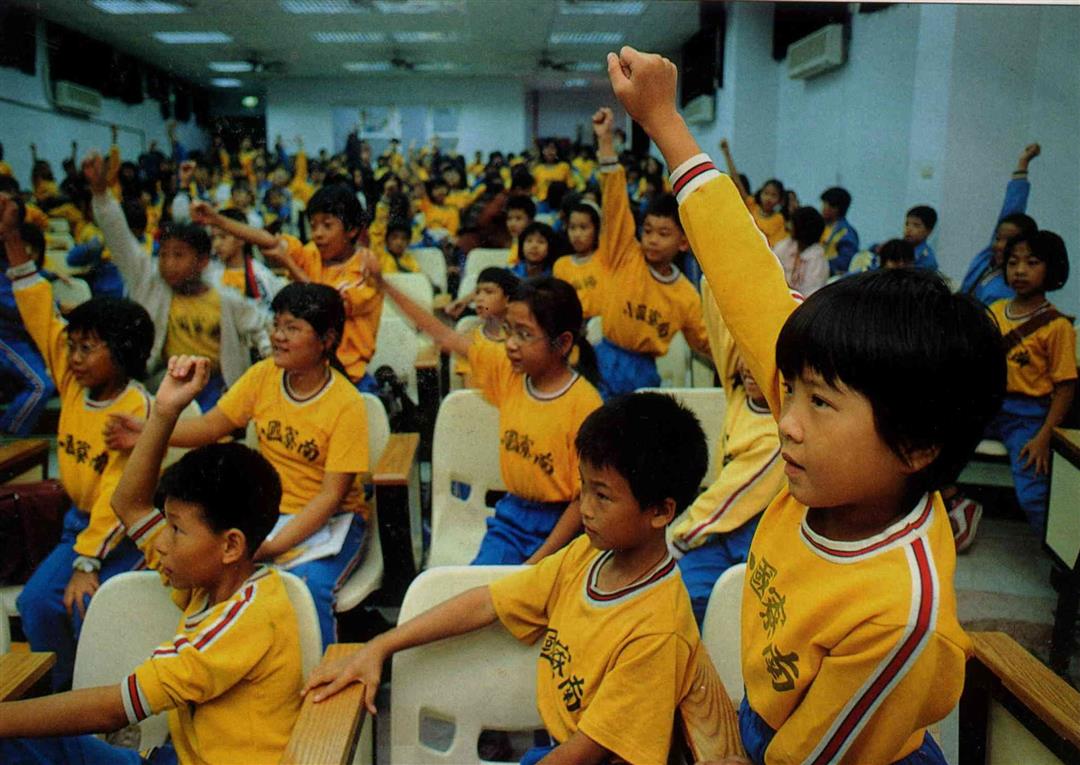
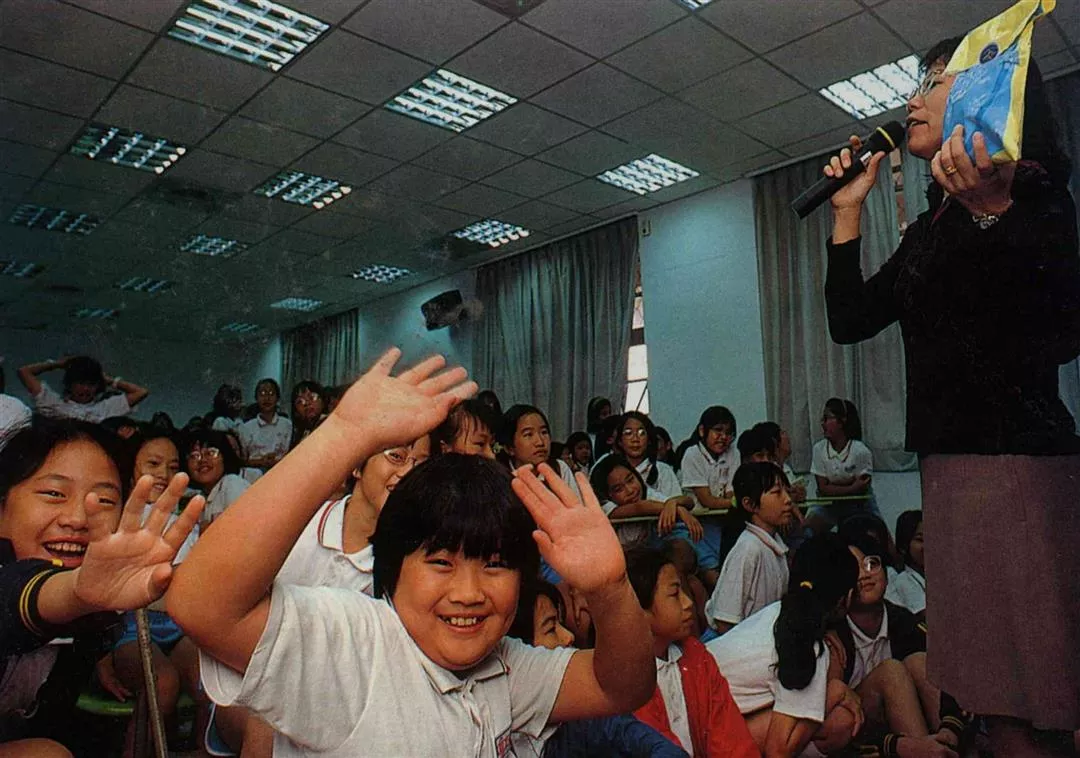
Because of a lack of qualified teachers of sex ed, the lecturers sponsored by private companies are swamped with demands for their services. The companies get to promote their products while offering sex education . The photo was taken at the Minchuan Primary School in Taipei.
Is "intercourse" the be-all and end-all of youth sex? Of course not. Sex education, guided by the principle of "accepting yourself and understanding the opposite sex," is being strongly promoted on campuses at all levels of education in Taiwan. What is its content? And how effective is it?
Just waking up from their lunch-time siestas, fifth-grade girls at the Minchuan Primary School in Taipei City follow their teachers to the audiovisual room. Today, the topic in health class is "growing up with confidence."
The film begins. The cartoon figure of a naked girl appears on the screen, and she begins to grow. Her breasts enlarge, her thin waist grows into hips, and she begins to sprout pubic hair. The girls begin to giggle and laugh, as if they're looking at some kind of freak show. Then the cartoon boy begins to grow, his Adam's apple protrudes, and he grows facial and pubic hair. Finally, when his penis becomes erect and ejaculates sperm, the screams and laughter of the girls reach such a pitch that the room is shaking. Many girls cover their eyes, and shouts of "Disgusting!" and "What the heck is this?!" fill the air.
The most welcome "shock education"
Don't misunderstand, this isn't a showing of a pornographic film. This is the school helping children who are about to enter puberty. The school has asked a nurse from a sanitary napkin company to come to the school to instruct fifth-grade girls in understanding the changes they and their male classmates are soon to experience, and how to handle menstruation.
Judy Hsiao, a professional affairs representative for Proctor and Gamble who is giving the class, says that less than two years ago, this type of "shock education" could only be shown to students in middle school or above. However, since nutrition these days is much better, children mature faster. They experience menstruation and nocturnal emissions at an earlier age. Thus in the past two years the audience for this type of class has been extended to include fifth-grade students. The lecture ended, the teacher gives out beautifully printed health handbooks, as well as sanitary napkins for the girls to try. Because this type of class is sorely needed in schools, Hsiao is busy all year-round. She has given more than 200 classes in primary schools around northern Taiwan.
It is the same week, and male and female students at the Affiliated Senior High School of National Taiwan Normal University (NTNU) enter the main lecture hall in groups of two or three. The theme of today's lecture-sponsored by a condom company in cooperation with the Mercy Memorial Foundation-is "safe sex." This is the first such lecture at the school, and students are participating voluntarily during weekend "extracurricular activity" period.
After a brief five-minute play, the main speaker, Wang Jui-chi, a lecturer from the Mercy Memorial Foundation, broaches the main topic: "Students, if you keep a condom in the pocket of a pair of tight-fitting jeans, what will happen?" Students shout guesses in reply: "It will become misshapen!" "It will break!" "Someone will get pregnant!"
"Do boys have to be like the guys in porn movies and keep going strong for 30 minutes in order to be considered real men? How is it that porn stars can be so 'virile'?" Again there are answers: "Because they don't insert in the first place!" "Because the scenes are shot separately and spliced together!" "It's computer animation!" "Because these guys are just doing a job, and are so numb to what they are doing they can't 'finish it off!'"
Amidst the sounds of laughter the lecture ends. Then, several upright models of erect penises are placed on a table for the students to try putting condoms on. Girls who have never seen one before cover their mouths and giggle. Boys on the other hand rush to take their turn. Off to one side you can hear the instructor's voice of caution: "Don't underestimate the knowledge required to use condoms. Last time there was one studly guy who put the condom on inside out!"
Between repression and licentiousness
Many parents still refer to children's sexual organs as "the little chickie" or "younger sister." They say things like "children come from their mummy's belly-button" or "it's better to die than lose your virginity." It is with such euphemisms and outdated views that they (mis)guide their children.
Meanwhile, in schools at all levels, these obstacles to open discussion are being transcended and sex education is being strongly promoted. Through various channels, topics covering everything from the use of condoms and sanitary napkins to reproductive biology, sexual psychology, and sexual attitudes (including gender identity, sexual morality, and so on) are being introduced onto the campus. These subjects are being discussed openly in the halls of knowledge, and questions are being asked and answered frankly and freely.
For millennia, parents and teachers have seen sexual knowledge as "forbidden fruit." They have been deeply afraid that once their children know about sex, they will become over-stimulated and seek to try it. Are such worries exaggerated? It is clear that different people and schools have very different answers to this question.
When asked whether she would really like to have a boyfriend and try sex, a girl who had just witnessed the condom lecture at NTNU Affiliated High School said decisively: "Definitely not. I don't want to consider anything like that until after I pass the university entrance exam." At another school where a similar class had been arranged, the guidance director stated that the school asked teachers to urge students "in need"-i.e. those who already had friends of the opposite sex-to go to the lecture, "because they would be much more likely to need this knowledge."
Edwin Yen was a pioneer who was studying and promoting sex education for schoolchildren as long as 20 years ago; he is now director of the Health Education Department at NTNU and executive director of the Mercy Memorial Foundation. He points out that in the past the education system was conservative. Sex was considered to be dirty and vulgar, not worthy of the halls of knowledge. Children were left to find out for themselves as best they could.
Fortunately, over the past ten years or so, society has opened up considerably and the barriers to sex education have been greatly reduced. On the other hand, sex education faces a new and even stronger challenge: The market is filled with ridiculous distortions about sex, with unrestrained sexual activity being encouraged in sexual publications, pornographic programs on cable TV, reporting of sex scandals in the news media, and encouragement of sexual liberation by some feminists.
Today, the goal is to keep children from being affected by the two extremes of repressed desire or ignorant promiscuity, and to help them establish correct sexual attitudes as early as possible. Thus the Ministry of Education has begun to promote sex education in schools under the name of "sex and gender equality education." It has been discussed and seminars have been held continually at schools at all levels. Sexual education has gone from being a taboo subject on campuses to being one of the most prominent aspects of educational reform.
Accept yourself, appreciate others
In that case, what exactly is being taught in sex education?
Ho Chin-tsai, who is a member of the Ministry of Education committee in charge of promoting sex education, describes its guiding principles: "Sex education begins from understanding and appreciating one's own body, and progresses to appreciating the opposite sex with which one interacts. In addition, it encourages understanding and tolerance of oneself and others, and of different modes of sexual expression and sexual values in society."
Take "understanding one's own body." Judy Hsiao says, for example, that you should not assume that everyone knows about sexual biology just by experiencing it. Didn't people in the past just muddle their way through in growing up regardless of whether they were taught or not? In September of this year, just after schools reopened, she heard the following tale about one girl in a primary school in Taipei County experiencing her first menstrual cycle.
This fifth-grade girl took sick leave for a week. When her teacher went to visit her, the girl cried despondently, "I can't stop bleeding. I'll probably die!" It turns out that the girl's parents were divorced, and her single parent father was busy working, and had no time or energy to look after his daughter during this fearful and embarrassing time.
Differences in nutrition and inheritance mean that some children grow up more quickly or more slowly than others. Children at that age most fear falling behind others. Middle-school girls worry greatly that they are "washboards" (flat chested), and are too embarrassed to broach the subject of buying a bra with their moms. Boys fear that they are not "hung" enough. Ignorant as they are, they take totally unrelated things like the size of their noses as the basis for comparison of their "manhood." The sense of inferiority of slight and short boys can become so serious that it becomes a learning impediment.
"These types of worries that arise from individual differences must be dealt with through correct education. Moreover, children must be encouraged to improve and develop themselves through sports and nutrition, so that they can have confidence that they are in charge of their own bodies," says Chung Chu-chen, a volunteer lecturer at the Hsinchu family services center, who has had a great deal of experience in education.
Nocturnal emissions and masturbation
Another point to consider is that, seeing as puberty is "mating season," young people are especially sensitive about their appearances or any dissimilarities with other kids. Many things that in the eyes of adults may be trivial can deeply affect a child's self-respect and self-confidence.
Chou Li-yu, principal of the Wanfang Middle School, relates that once a boy sent her a letter asking that he be permitted not to wear the summer uniform (with short pants) because he had especially hairy legs. Also, many young girls who develop quickly, in order to hide their all-too-noticeable breasts, wear their winter school jackets all year round, even in the worst summer heat. This is why Chou, who deeply understands the concerns of young people in their early teens, has never made seasonal uniform changes compulsory.
Another common phenomenon which young guys worry about is nocturnal emissions. The testicles mature during early puberty, and begin to manufacture sperm. If it is not released, it will spill out when it reaches a certain saturation level. Though this is completely normal, many people in Taiwan have tremendous misconceptions. There are giant advertisements in the newspapers, using sinister or frightening language, offering "cures" for so-called "loss of control at the sperm gate" or "leaking of essence." Even many adults spend lots of time and money trying to compensate for a so-called "kidney deficiency" that is connected to ejaculation (the kidneys are supposed to govern sexual activity). If no one explains things to children, they can easily jump to wild surmises on their own.
Masturbation is another important element of sex education for boys in puberty. Just as there is unfounded fear of "kidney deficiency" with nocturnal emissions, many boys who play the "forbidden game" worry that they may be "sex-crazed." And since masturbation is ordinarily accompanied by sexual fantasizing-perhaps about girl classmates or even one's own sisters-boys can suffer from feelings of guilt.
"In fact, masturbation is the best way of taking care of the onrush of sexual desire in puberty. So long as children do not become obsessed, parents don't need to interfere," says name Chiang Han-sun, head of the Department of Urology at Taipei Medical College and a director of the Chinese Association of Sexuality Education.
It should be noted, however, that masturbation is not exclusively an issue for teens. Children from age 3 to 6 commonly play with their own reproductive organs. Sadly, many adults who don't understand that this is normal will, as soon as they see a child doing this, beat them or tie their hands. There have even been nursery schools which have forced children to strip and "show the class" in order to humiliate them into stopping. "This type of violent and repressive technique, though it may prevent the behavior for a short time, could very well lead to all kinds of sexual problems for that person in the future," says Chiang.
Studies abroad suggest that adult sexual problems such as exposure, fetishes, impotence, or premature ejaculation are all related to repression of sexuality in early childhood. Sufferers of these problems find it impossible to have normal adult sexual relationships, which leads to a terrible loss of happiness over their entire lives.
Don't test the high notes
Besides the understanding and acceptance of one's own body, sexual education also emphasizes understanding and respecting the opposite sex. Take for example menstruation. Judy Hsiao points out that many girls feel ill at ease about menstruation, mainly because they fear being laughed at by their male classmates. She has seen cases in which co-ed classes have been taken to lectures on sanitary-napkin use, and the boys protest: "These things that girls use are disgusting. Why do we have to look at them?"
When she runs across such situations, Hsiao always asks: "Is your mother not a girl? How about your future wife? Is it possible you don't love them, and don't want to understand their needs?"
Chou Li-yu says: "Sex ed need not always be about sexual relations between boys and girls. It can in fact be related to things that are very much a part of the daily routine." For example, she says, everyone agrees that girls having their periods can be excused from gym class. By the same token, music teachers can try to understand the problems of boys who are at the age when their voices begin to break, and not test them on singing songs that have high notes or may harm their voices. This would be an excellent "sex education" model.
Of course, the foundation of sex education is still sexual behavior, because puberty is after all a time when young people begin to seek out partners. At what age and under what conditions should children be allowed to engage in sexual activity? This is the problem that most concerns parents.
According to a 1996 survey by the Taiwan Provincial Family Planning Center, 8.5% of high school students had engaged in sexual behavior. Although current sex education does not directly touch on sexual behavior, two of the main points are contraception and prevention of sexually transmitted disease. Thus there are now lectures on condom use in high schools.
Assault and identity
There's also the problem of sexual assault. Since the passage of the new sexual assault prevention law last year, middle and primary schools have been required to devote four class hours per academic year to instructing children in preventing sexually related crimes. Many schools have begun self-defense classes, and put on little anti-kidnapping dramas such as "Little Red Riding Hood and the Big Bad Wolf." The problem is that this is a rather unusual angle from which to approach relations between the sexes, especially since children are being taught how to fight off the opposite sex even before they have learned how to get along with them. Although for various reasons these classes were considered urgent, there is some concern that they may have bad side effects.
Edwin Yen explains that "sexual assault prevention education is essential," in light of the large number of sexual assault cases (including incestuous rape) in Taiwan. While all children are taught self-defense, boys are also taught how to give release to their growing desire and how to avoid using sex as a weapon to hurt others as a way of venting the frustrations of daily life. These all fall within the scope of sex education.
Looking farther down the road, to cope with an increasingly open and pluralistic society, sex education should also include acceptance and understanding of "non-mainstream" sexual expression. Homosexuality is one example. Unfortunately, little research has been done in Taiwan on this subject, and there are few ready-made teaching materials for teachers to use in class.
Su Chien-ling, a board member of the Awakening Foundation, points out that "sissy" boys and "tomboy" girls are often looked down upon by teachers and classmates. There are cases of middle school boys ganging up to "teach" tomboy girls "a lesson," and of feminine boys being beaten up by their male classmates or even being "sexually harassed" by female classmates. These are not rare problems. Therefore, in the plan for "gender equality education" which is being promoted as part of sex education, strong efforts will be made to break through gender stereotypes and to encourage children to have a broader sexual outlook.
Starting from the beginning
Chiang Han-sun says education can be roughly divided into the two areas of "knowledge and technical education" on the one hand and "life education" (how to live an appropriate and beautiful life) on the other. Sex ed is the most fundamental aspect of life education.
Chiang emphasizes that, while knowledge and technical education can be lifelong, without any age limitations, the situation is different with life education. "Life education follows age. From infancy to childhood to puberty, there are biological and psychological needs that develop with age. If these needs are not adequately satisfied or guided in the right direction, once the opportunity is missed and a person's character is formed, it is extremely difficult to turn things around." Chiang emphasizes the urgency of sexual education, and takes for example the idea that "if a girl can get correct information about menstruation before age 10, she can understand better how to cope with her periods and reduce the physical and psychological distress they may bring.
There's already a consensus on the importance of sex education. However, teacher training and class design are still at the embryonic stage.
"Sex education in fact begins right from childbirth. Moreover, sexual attitudes begin to take shape very early in life. Thus, primary school is an important period for introducing sex education," says Huang Ya-wen, chairperson of the department of health education at Taipei Teachers' College. Frustratingly, in the current primary school curriculum, the only thing related to sex education is the "morality and health" class which is taught two periods a week. Sex education constitutes only an extremely small part of that class. It is very difficult for kids to build a comprehensive outlook on sex from the occasional lectures they get.
Even more disappointing is that, of the nine teachers' colleges in Taiwan, few make health courses required. Some don't even have a professor specializing in health education. "Primary school teachers have never studied the subject themselves, so how can they teach it to their students?" sighs Huang Ya-wen.
With sex education just getting started, primary school teachers must rely as much as they can on outside resources. They need the help of such organizations as the Mercy Memorial Foundation and its lecturers, the family education services centers in various locations, women's groups, and private industries making feminine-hygiene and sex-related products.
What about middle and high schools, whose kids are hitting puberty? The only sex ed in middle schools is the stuff on "secondary sexual characteristics" in "health education" texts in the first and second years of middle school. At the high school level, girls at least can attend health care classes where they can discuss issues related to women's biology. But boys don't even have this.
Under these circumstances, schools must scramble and find their own way. For example, the private Chiangju High School has a "sex education week" for boys every December. The school shows a sex-ed film every day at noon during this week, and boys are asked to write an essay on what they have learned from the film; there is also a health teacher on hand to answer questions.
Lacking any definite curriculum or teacher training, most schools invite outside specialists to give lectures during the time set aside for weekend extra-curricular activities. However, the lectures are not linked together-this time the topic may be biology, next menstruation, and the next time sexual assault-so the knowledge imparted remains superficial and unsystematic.
An inglorious "first place" in Asia
Sex education is something that is brand new in Taiwan's post-repressive society, and for many senior teachers it is still a vulgar subject. Many of these teachers muddled through their own very naive youths, and they are unable to answer the kinds of in-depth questions that young kids today can pose. For example, as feminists raise high the banner of "Orgasms, not harassment!" students may ask the teacher: "What is an orgasm?" "How can you achieve orgasm?" Some teachers think these students are being deliberately provocative and give them a demerit.
The Ministry of Education's Ho Chin-tsai says that today many parents complain that schools don't teach their children to be diligent at the books, but teach too much trash that only "distracts" them from studying. No wonder, with the undercurrent of conservatism still flowing strong, that many teachers prefer to live by the rule "the less taught, the less trouble," says Ho.
Taiwan's long-term inadequacy in sex ed is most obvious in one of Taiwan's inglorious "top rankings in Asia." Among the newly industrialized countries of Asia, Taiwan ranks first in pregnancy among girls aged 15-19. Taiwan has a rate of 17 per thousand, much higher than the figures for Japan (4) and Korea (11). Though the statistics do not say how many of these are unwed mothers, in any case pregnancy at an age before the uterus is fully mature is highly dangerous, and should be avoided.
Liu Tan-kui, a specialist in the Bureau of Health Promotion and Protection at the Department of Health, says that the 16,000 babies born to "little mothers" each year are a great burden for society. Statistics indicate that "80% of 'little mothers' know nothing about contraception, which demonstrates a tremendous shortcoming in sex education in Taiwan."
School and families link up
The chance for improving this dismal record has arrived. Edwin Yen explains that of the seven core areas in the new nine-year standard curriculum that will go into effect in 2001, "health and physical education" (including sex education) is ranked right up there as an equal with languages, the humanities, social studies, natural sciences, technology, and mathematics. It will receive 10 to 15% of total class time.
Under this structure, in the future sex ed will naturally receive its share of teachers, budgets, and attention to class design. Yen sees this as the greatest accomplishment of his more than 20 years of "plowing the ground" for sex ed.
Nevertheless, Chiang Han-sun, who has worked hand-in-hand with Yen these many years to promote sex ed, offers a cautionary reminder: "Sex is the most intimate of human relationships, so sex education should be led by those closest to the children-parents are the best guidance counselors."
Chiang says that there is no other road to successful education than "love" and "setting a proper example." Parents are the most important models for their children's sex education, and the example of a loving marital relationship is more important than a thousand classroom lectures. It's just that most parents don't know how to take the next step and explicitly teach their children, so the schools must help them out.
Sex is part of human nature, right from infancy. It is not a bad thing. Now that sex education has entered its infancy, it also needs lots of attention from all concerned.
p.20
(courtesy of Macrovision Culture Company, Ltd.)
p.21
"How can an uncircumcised boy keep his penis clean?" Boys and girls alike rush to guess the answer without a trace of shyness. The photo was taken in a sex education class in the Nanliao Primary School in Hsinchu.
p.22
Because of a lack of qualified teachers of sex ed, the lecturers sponsored by private companies are swamped with demands for their services. The companies get to promote their products while offering sex education. The photo was taken at the Minchuan Primary School in Taipei.
p.23
This year, for the first time, lectures and demonstrations on condom use are part of the high school curriculum. It's a real eye-opener for a lot of students.
p.24
The human body is neither dirty nor shameful. In physical education classes, boys and girls touch each other in a natural way, helping them build up a healthy attitude toward contact with the opposite sex. (photo by Hsueh Chi-kuang)
p.25
Sex education starts in the home. Bath time is a good chance to teach children about the differences between the bodies of boys and girls and break through the veil of mystery that obscures gender characteristics.
p.26
In ancient times sex was strongly repressed for women. It was only on the eve of the wedding, when a bride-to-be opened her dowry box, that she got her first inkling of what sexual union is all about.
p.27
Pregnancy is a critical aspect of sex education. (photo by Diago Chiu)
p.28
Today gender roles are less rigidly defined. (photo by Huang Lili)
p.30
Sex education is just getting started. Let's hope that in the future the two sexes can grow up together in a healthy and natural way.
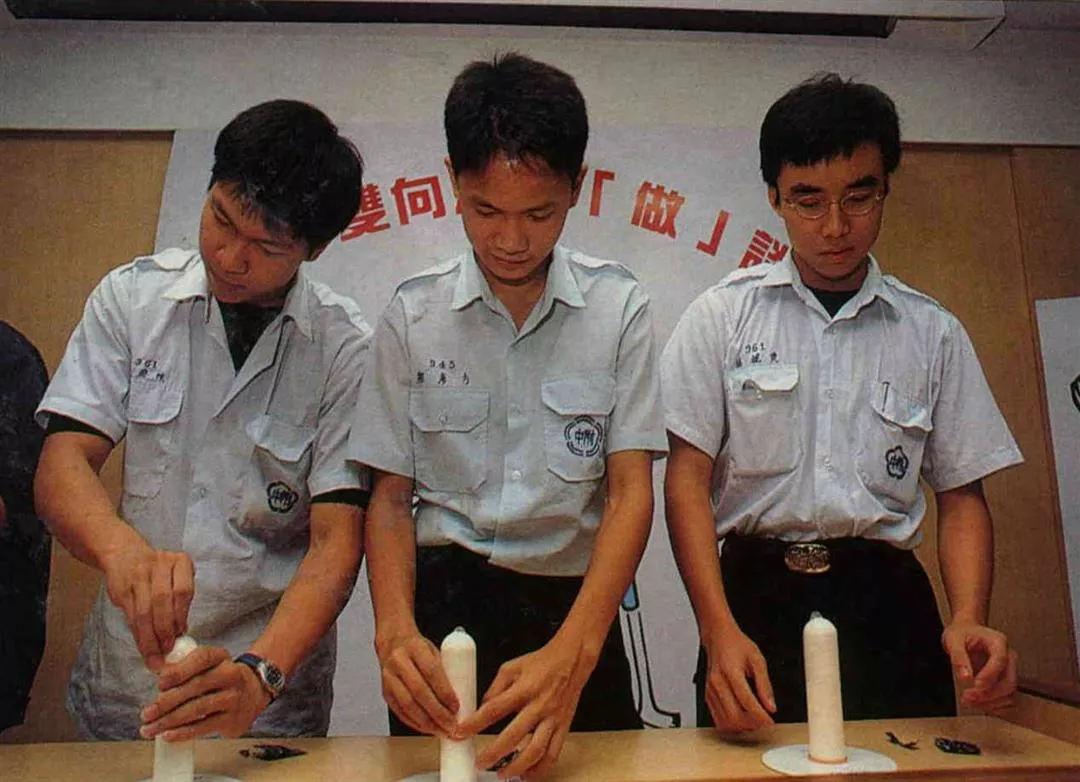
This year, for the first time, lectures and demonstrations on condom use are part of the high school curriculum. It's a real eye-opener for a lot of students.
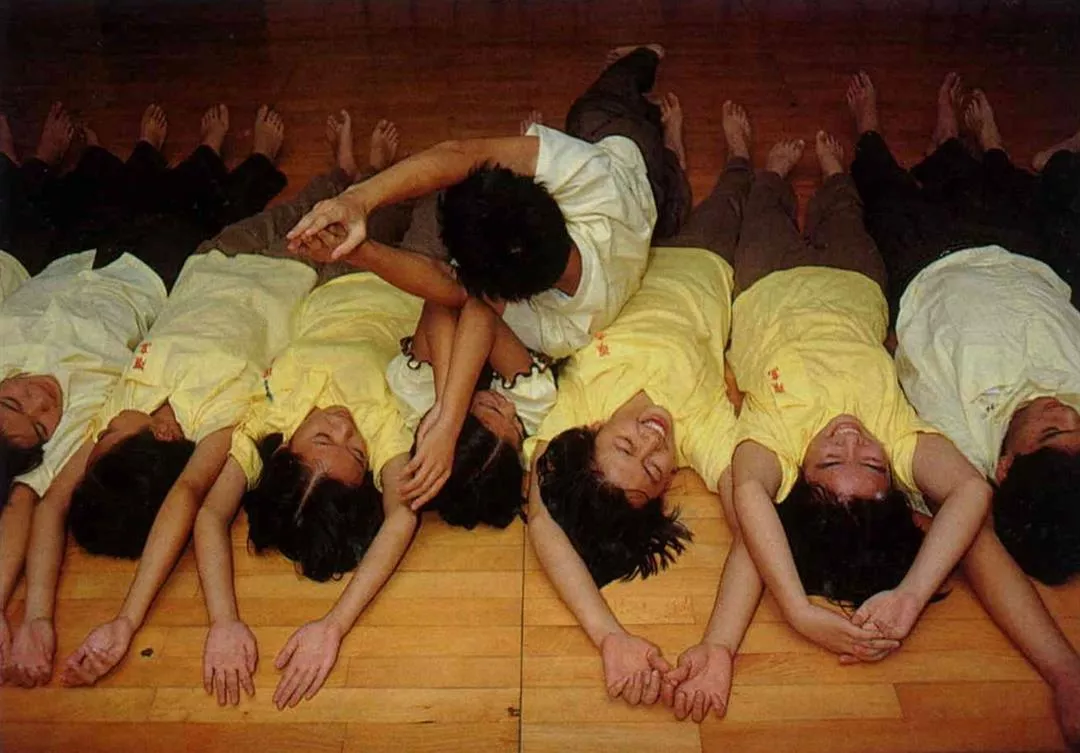
The human body is neither dirty nor shameful. In physical education classes, boys and girls touch each other in a natural way, helping them build up a healthy attitude toward contact with the opposite sex. (photo by Hsueh Chi-kuang)
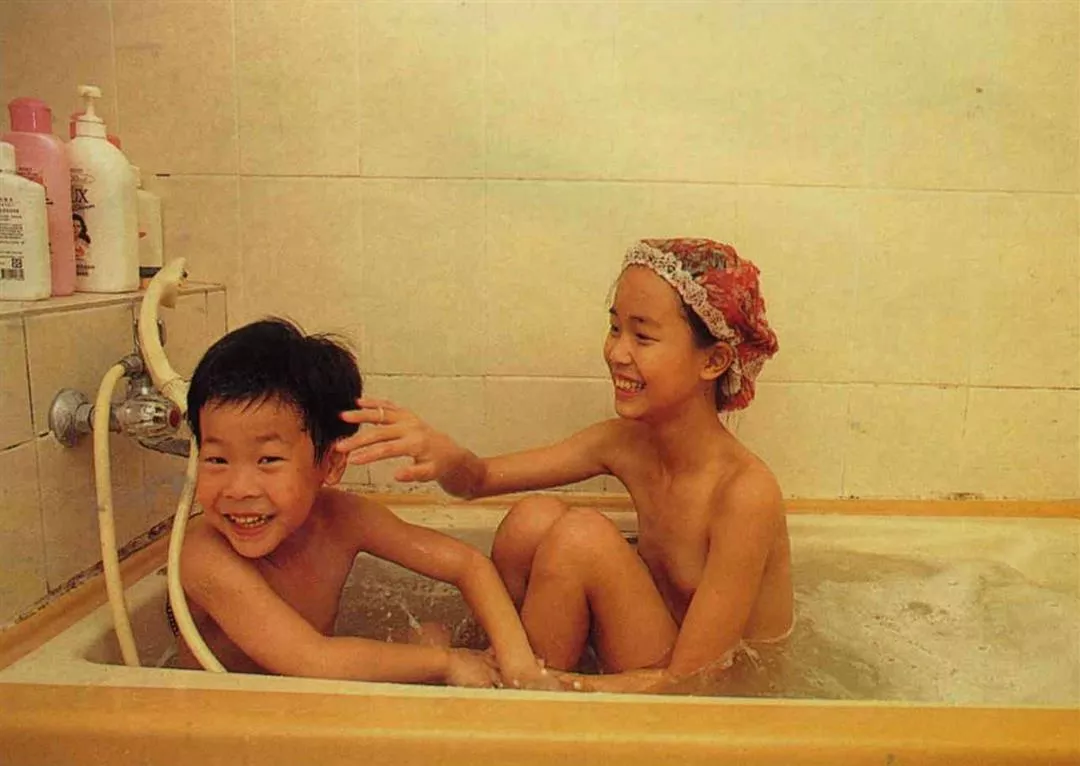
Sex education starts in the home. Bath time is a good chance to teach children about the differences between the bodies of boys and girls and break through the veil of mystery that obscures gender characteristics.
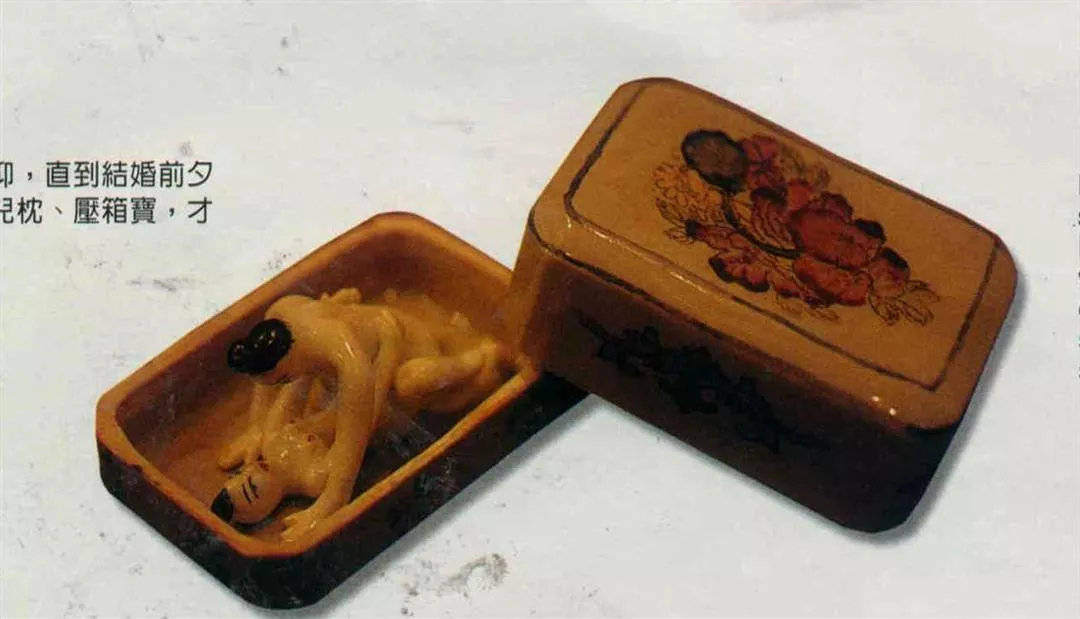
In ancient times sex was strongly repressed for women. It was only on the eve of the wedding, when a bride-to-be opened her dowry box, that shegot her first inkling of what sexual union is all about.
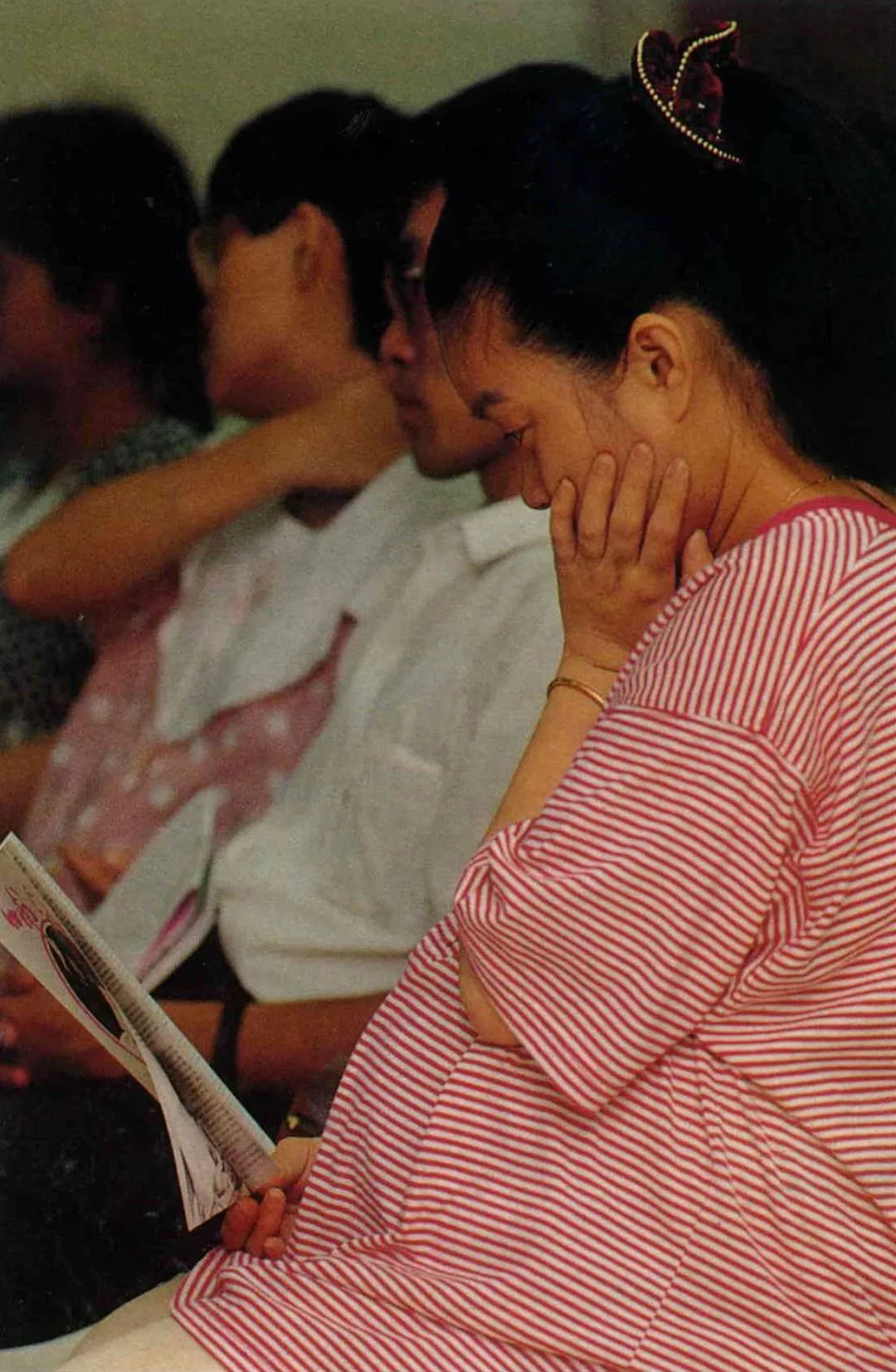
Pregnancy is a critical aspect of sex education. (photo by Diago Chiu)
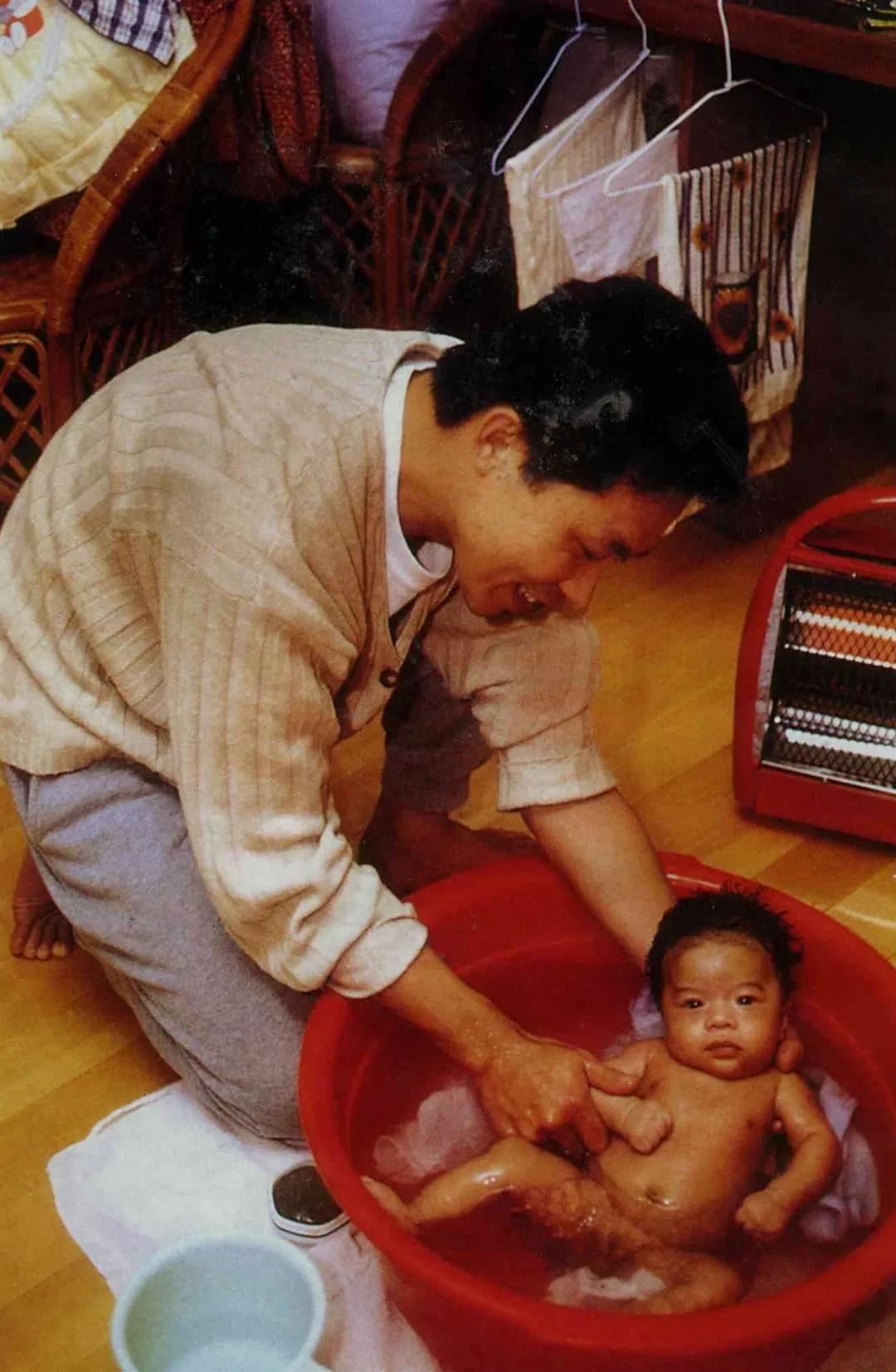
Today gender roles are less rigidly defined. (photo by Huang Lili)
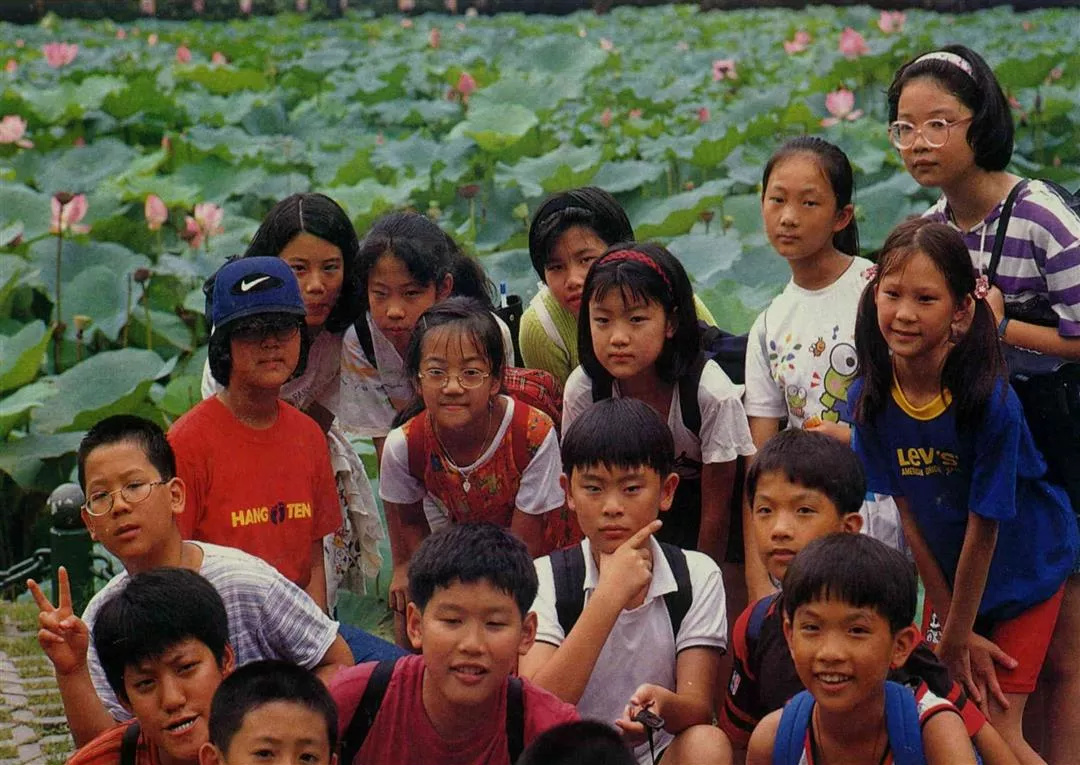
Sex education is just getting started. Let's hope that in the future the two sexes can grow up together in a healthy and natural way.




@List.jpg?w=522&h=410&mode=crop&format=webp&quality=80)


